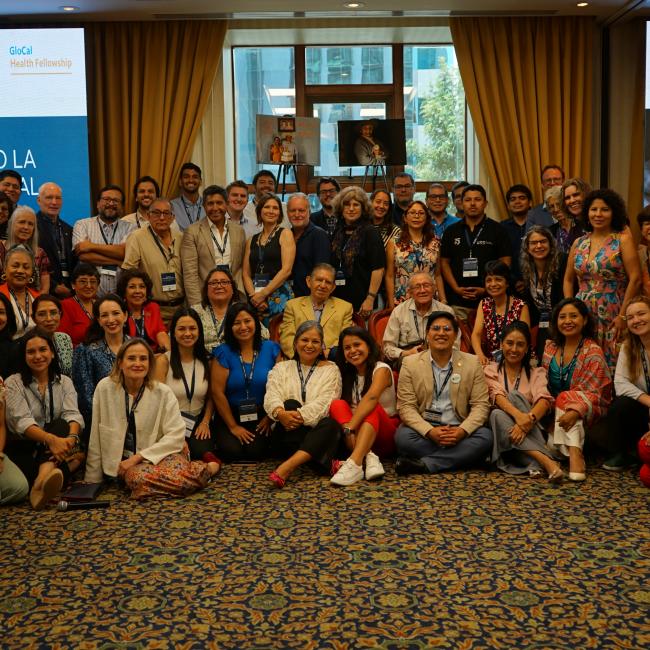GBHI Gathers Brain Health Specialists to Focus on Dementia in Latin America and Beyond
Scientists, Clinicians and Health Professionals Convene to Consider the Latest Research and Ideas in Dementia.
“Brain health is embedded in equity,” said Victor Valcour, MD, professor of neurology and executive director of Global Brain Health Institute (GBHI), to open the Alzheimer’s Association International Conference (AAIC) Satellite Symposium in Sao Paulo, Brazil, on April 10. “Risk factors for dementia are rooted in health disparities.”
It’s no surprise, then, that Brazil and, more broadly, Latin America—where a third of the population lives in poverty with limited access to health care, combined with one of the world’s fastest growing elderly populations—are experiencing growing rates of dementia faster than most of the world.
Such was the setting for this global gathering of about 600 scientists, clinicians and health professionals, co-hosted by UC San Francisco and Trinity College Dublin’s collaborative GBHI.
A Growing Problem
In Brazil, about 1.7 million people live with dementia, and three quarters of them are undiagnosed. Across Latin America, roughly 4.6 million people have dementia, and two-thirds of them have Alzheimer’s disease. Like much of the world, dementia cases in Latin America are expected to triple by 2050.
“With this will come great challenges in dementia care, diagnosis, and prevention,” said Valcour.
The prevalence of dementia is higher in Latin America than much of the world, including North America and Europe, in part due to the aging population, but also because of health disparities. Dementia symptoms tend to emerge earlier in Latin American populations than others, likely due to low literacy rates, few years of formal education, high rates of poverty, and limited access to health care.
Together, these attributes reduce “cognitive reserve”—or the brain’s ability to adapt—which may protect against dementia symptoms. Further, many Latin Americans have high blood pressure and diabetes—known risk factors for dementia—compared to people in high-income countries.
There is no cure for dementia, but drug and behavioral interventions—such as healthy diet, regular exercise, and controlling blood pressure—are thought to delay onset of symptoms, and thus prevent disease.
Thinking Locally, Acting Globally
The aim of the symposium was to consider the latest research in dementia science and the need to create a National Dementia Plan for Brazil, part of the WHO’s 2017 goal to make dementia a public health priority.
The three-day meeting featured contributions from Atlantic Fellows for Equity in Brain Health at GBHI, including Maira Okada de Oliveira, who is working to improve diagnosis of dementia among illiterate groups in Brazil; Elisa Resende, MD, who is studying how teaching literacy to adults in Brazil has a high potential to lower their risk of dementia; and Barbara Costa Beber, PhD, who is increasing awareness of dementia among Brazil’s 40,000 speech and language therapists.
“From projects rooted in local communities, to national training initiatives and pan national networks, we want to equip leaders with tools to address dementia across Latin America and beyond,” said Lea Grinberg, MD, PhD, associate professor of neurology and GBHI executive committee member.
In addition to discussing the unique challenges dementia poses for Latin American countries, the AAIC Satellite Symposium considered a wide range of dementia-related topics, including sleep medicine, gender differences in dementia, and how to reduce stigma about dementia.
Atlantic Fellows Boon Lead Tee, MD, MSc and Yue Leng, PhD, MPhil—as well as Drs. Flavia Garcez and Ismael Calandri—won best posters for their respective projects, “Neurolinguistcs Presentation of Chinese Speaking Primary Progressive Aphasia Individuals” and “Sleep Medication Use and Risk of Dementia in a Biracial Cohort of Older Adults."
Brian Lawlor, MD, deputy director of GBHI, said he is hopeful the gathering will emphasize the importance of a public health approach to dementia, and thus strengthen collaborations and innovations. “Together as an activated community, change can be delivered,” said Lawlor.
Authors

Niall Kavanagh
Communications Officer
GBHI Members Mentioned

Victor Valcour, MD, PhD
Site Director, University of California, San Francisco

Maira Okada de Oliveira, PhD
Neuropsychologist
Elisa França Resende, MD, PhD
Neurologist

Maira Okada de Oliveira, PhD
Neuropsychologist

Lea Tenenholz Grinberg, MD, PhD
Professor of Neurology and Pathology

Boon Lead Tee, MD, MS
Neurologist

Yue Leng, MD, PhD
Epidemiologist

Brian Lawlor, MD, FRCPI, FRCPsych, MRIA
Founding Director, Trinity College Dublin


